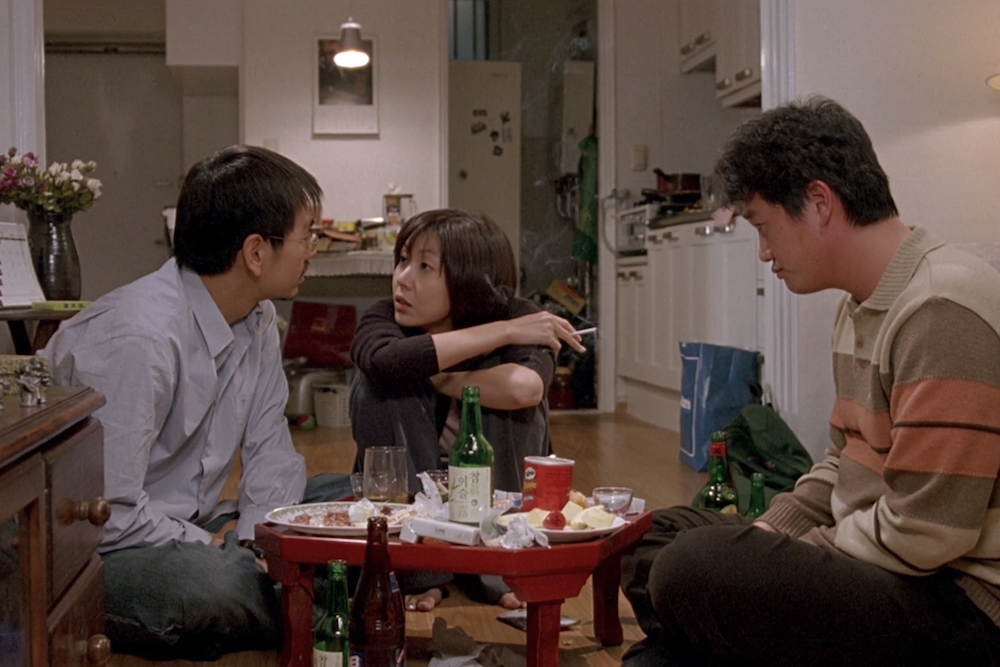I’m a big fan of the films of Hong Sang-soo, and something about them—their long, lingering scenes in bars, the conversations that trip over art and love and the differences between the sexes—feels particularly right for this moment when many of us are stuck indoors. Luckily, MUBI is running a series dedicated to his work, including 2014’s Hill of Freedom (a personal favorite, which follows a Japanese man as he wanders through Seoul trying to find a lost love, but is really about the unreliability of narrative) and 2004’s Woman Is the Future of Man (which I had never seen before), his first film to open theatrically in the U.S. Hong’s films are deceptively simple, seemingly a series of variations on a basic theme—romantic drama, alcohol, unreliable narrators—but there are always a few formal twists, a playful approach to the concept of linear time, to keep the viewer on their toes. —Rhian Sasseen
Hello! It’s good to see you again. But why are you reading staff picks when you could be watching the all-star panel Community Bookstore organized to celebrate the NYRB Classics reissue of Leonora Carrington’s The Hearing Trumpet? By no means do I intend this as a knock against staff picks; as usual, my colleagues have delivered excellent recommendations, and I encourage you to read (and act upon) each and every one of them. But with a lineup like this—Chloe Aridjis, Kathryn Davis, Danielle Dutton, and Merve Emre, all brought together by the globe-flattening power of Zoom—perhaps you’ll understand the urgency of my question. I’d greatly appreciate if you considered, at the very least, opening the discussion in another tab of the internet browser of your choice; this can be done at no cost to you beyond the paltry fraction of a calorie burned in the action of a click. —Brian Ransom
Long ago, I picked up Eimear McBride’s A Girl Is a Half-Formed Thing based on the title alone and got only a few pages in before setting it down. I was in those preteen years when you suddenly start thinking of yourself as a capable, mature adult and are always desperate to prove it—or maybe that was just me, using words I half-understood, reading experimental literature. Despite my trying, the prose remained elusive. I had overestimated myself as a reader, I realized, and could not parse the dense stream-of-consciousness narrative enough to make sense of it. Recently, though, inspired by the dynamism of Sarah Crossan’s experimental novel Here Is the Beehive (and emboldened by my grasp of it), I found A Girl Is a Half-Formed Thing on my shelf and made a new attempt. Eschewing the familiar rules of punctuation, grammar, and sentence structure, McBride doesn’t make the reading easy, but without the constraints of convention, such gorgeous syntax is allowed to emerge, which makes the perplexity more than worth it. Phrase after phrase both challenged and enamored me, an intricate negotiation I was not ready for all those years ago. Structurelessness and Joycean experimentation aside, I’m not surprised I couldn’t decipher McBride’s novel when I was younger. After all, it’s a coming-of-age story, and what did I know of that back then? —Langa Chinyoka
In the 2019 short film Men of Vision, a failing veteran inventor and a quietly brilliant new inventor cross paths thanks to a shared mentor. This period piece has plenty of jokes about inventions relating to the shortsightedness of human beings and our inability to anticipate the future. As a child, I would dream up contraptions and mechanisms with little use or value outside my own little world, but I never took any steps to actualize them. Dreaming about possibility is natural, I suppose. But Men of Vision warns about the narcissistic hunger born out of egotism and possibility. Instead of majestic flying trains, our fixations may lead us to magnetic candles. —Carlos Zayas-Pons
I wonder if there’s something about Texas that makes memoirists of its writers. Emerson Whitney’s Heaven begins in “Old Texas like in the movies … where dip tins make circles in everybody’s back pocket.” Thematic comparisons could be made to the work of Mary Karr, but Whitney stands as a deft executor of their own unique style. Like a patchwork quilt, Whitney sews memories tightly together with Maggie Nelson, the DSM, and etymology. But for being so learned, the book is never didactic, and for being peripatetic (we do leave Texas), it feels solid, is emotionally even-keeled even across the stormiest subjects. Whitney is a writer who guides with an intuitive vulnerability and honesty, and at its core, Heaven is an examination of the body as an inherited thing. —Lauren Kane
from The Paris Review https://ift.tt/3bKwIlw



Comments
Post a Comment